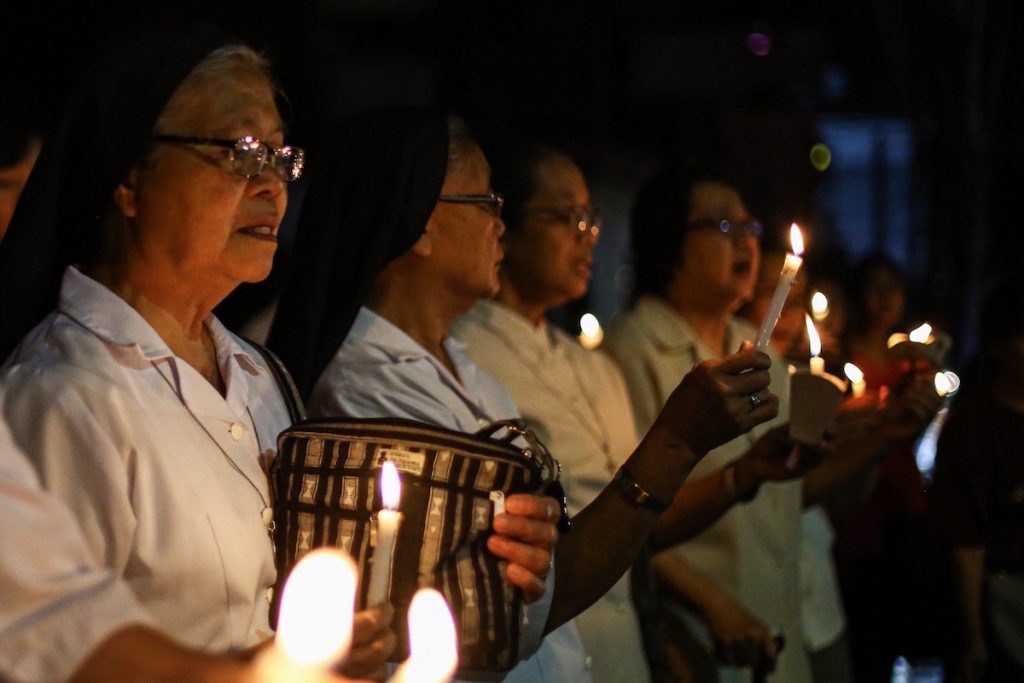Philippine church and peace groups are not giving up on the task of pressing the government and Asia’s longest-running communist insurgency to resume stalled negotiations.
More than 200 clergy, nuns, and activists attended a Manila forum in a display of “hope” days after President Rodrigo Duterte’s security officials dismissed peace negotiations as unnecessary.
Jose Ma Sison, exiled founder of the Communist Party of the Philippines (CPP), also called the prospects for peace under the mercurial national leader as “dismal” in a video talk.
While both sides held to respective unilateral ceasefires over the December and New Year holidays, the word war escalated in the early days of 2020.
Military officials announced for the umpteenth time a deadline for the total defeat of the CPP, the New People’s Army, and the National Democratic Front of the Philippines.
Congress is also pressing a new, draconian anti-terror bill that seems to target perceived legal networks of communist guerrillas.
Duterte, who insists on Sison’s return as a condition for talks, has yet to direct veteran negotiators to attend a second round of informal talks scheduled in the second or third week of January.
But to the religious who often work in the frontlines of conflict, “hope is non-negotiable.”
‘Up to us’
“Go back to the negotiating table and finish what you started,” urged thousands of signatories to a unity statement calling for peace.
“Unreasonable demands and pre-conditions can only delay the resumption of talks.”
“History has shown us that many times, when there were clamors growing among the citizens, this has aroused those in government to pause and to reflect, to see what the real situation is,” said Bishop Deogracias Iñiguez Jr., retired bishop of Kalookan, on the sidelines of a peace forum.
“It really is up to us,” he added.
“It is time to raise the banner of peace on all fronts,” said Archbishop Antonio Ledesma of Cagayan de Oro in the southern Philippines.
“Mindanao has already witnessed so much bloodshed. We are all brothers release and sisters living in the same land,” he said.
Sister Elenita Belardo, former national coordinator of the Rural Missionaries of the Philippines, has personally felt the lash of the state’s assaults.
The Religious of the Good Shepherd nun just posted bail in December for a perjury case filed by National Security Adviser Hermogenes Esperon.
But the 80-year-old Sister Belardo, who has spent more than half a century working with the country’s rural poor, told LiCAS.news.
“Even when everyone else beats war drums, we need to stand for peace,” she said.
“I always believe that dialogue is never a waste of time,” said Father Wilfredo Dulay of the Missionary Disciples of Jesus and leader of the ecumenical Religious Discernment Group.
“We have to assume, even though there is plenty of doubt about it, that there still some people of goodwill in the government,” Father Dulay added.

Hawks win
Duterte sent Labor Secretary Silvestre Bello and Hernani Braganza in December last year to hold informal talks in Utrecht, Sison’s base in The Netherlands.
They met with NDFP chairman Fidel Agcaoili and senior adviser Luis Jalandoni on Dec. 19 to 21.
The reciprocal unilateral ceasefires over the holidays raised hopes for more talks leading to the formal resumption of negotiations terminated by Duterte in Nov. 23, 2017.
But now, hopes are dimming. Not only have military officials thumbed down a new round of talks.
No less than the Presidential Adviser on the Peace Process, Carlito Galvez Jr., called the draft Comprehensive Agreement on Social Economic Reforms (CASER), worked on by negotiators of successive governments, “a surrender of the national government’s integrity and sovereignty.”
Duterte appointed the retired military general after terminating the talks.
The president may have made new overtures, but his top peace adviser said adopting the agreement and the Interim Peace Agreement, worked on by both sides’ representatives, would violate the country’s constitution.
The remark is telling. The agreement tackles all the socio-economic roots of conflict and includes many of Duterte’s campaign pledges, mostly later junked during his presidency.
Former negotiator Braganza, who has spent 15 years through various governments sitting across the table from communists, pushed back.
“Everything in that document is enshrined in the 1987 Constitution,” he stressed. “Social justice. People should read.”
“Treasonous? Wow. My god. We were appointed by the president. All our actions approved by the president. We have nothing to hide,” he said at the forum.
Officials of different government agencies acted as consultants for the government peace panel, he pointed out. The country’s best academics had helped in researching for and drafting the agreement.
“Beyond addressing inequity, the CASER we were negotiating, would spur economy. Agrarian reform is tied to economic development, commodities badly needed by Filipino people. Add jobs. That is my understanding,” said Braganza.
“Everyone knows it. Poverty and inequity spurs conflict. This war has gone on for 50 years. We have to end it by addressing its roots,” he added.
“And for the record, the National Democratic Front has never asked for territory,” he emphasized. “Not even a flowerpot.”
“And there is nothing in all those documents about a coalition government,” said Braganza. “I do not know why they keep on repeating this.”
When even veteran negotiators show this level of frustrations, hopes are dim, indeed.
But Father Dulay pointed out: “We have to go beyond this administration. This administration will not last forever. There is still a future to look forward to.”
“I can understand the skepticism but as Christians we have to believe that somehow, the good will triumph,” said the priest.
“What Christians can contribute to the development of peace is that we never lose hope,” he said.






